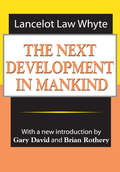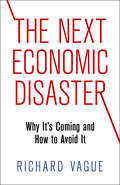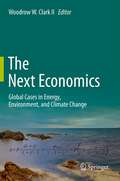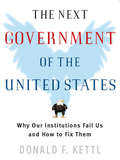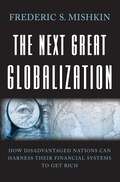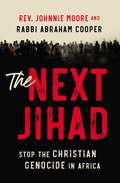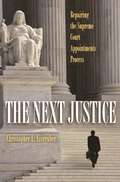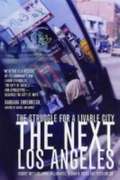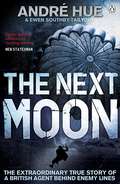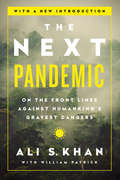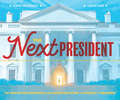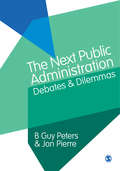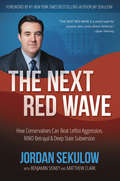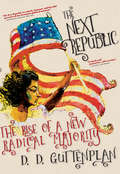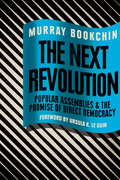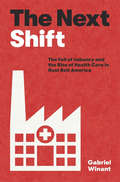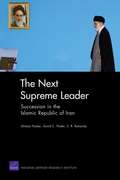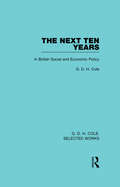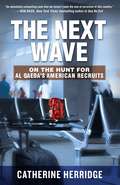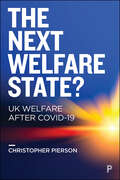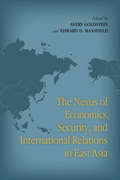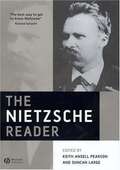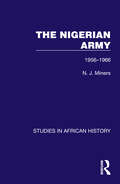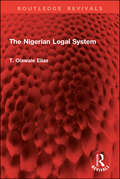- Table View
- List View
The Next Development of Mankind
by Lancelot WhyteThis searching examination of human development provides new perspectives on the moral, political, scientific, emotional, and intellectual divisions of our time. A physicist by profession, Whyte looked beyond the boundaries of specialization for creative ways to approach the basic problem facing modern Western civilization: Why are we so competent technically and yet unable to order our own affairs, socially and personally? He takes the reader with him on a journey that is nothing less than a new interpretation of the general development of human consciousness.Whyte's thesis is that the current stage of human development makes not only necessary, but inevitable, constructing a ""unitary method of thought"" to overcome the dualism of the modern Western mind. He argues that the deepest troubles of Western civilization are due, in large part, to excessive reliance on the ancient Greek postulates of permanence and invariance as an ordered form of thought resulting in an extreme, mechanistic anti-humanism. What culminated in two world wars, Whyte argued, is a European dissociation, or ""lesion."" This dissociation represents an achievement in terms of rational mastery of the natural and human worlds, unique social dynamism and differentiation, and the flowering of individuality. But the price was high: disordering of thought, emotion, and will; conflict between our deliberate and spontaneous, conscious, and unconscious energies; unstable polarization between a delusive unchanging ideal world and the reality of human transience and limitation. Whyte chooses nine thinkers to illustrate this historical and evolutionary movement, including Heraclitus, Marx, and Freud, and the resulting rignettes are a synthesis of knowledge that suggest, as well, a reorientation of thought, feeling, and action for the future.Lewis Mumford wrote of The Next Development of Mankind, ""The book has intense and immediate value both for the practical person and for the theoretic thinker."" Sixty years a
The Next Economic Disaster
by Richard VagueCurrent debates about economic crises typically focus on the role that public debt and debt-fueled public spending play in economic growth. This illuminating and provocative work shows that it is the rapid expansion of private rather than public debt that constrains growth and sparks economic calamities like the financial crisis of 2008. Relying on the findings of a team of economists, credit expert Richard Vague argues that the Great Depression of the 1930s, the economic collapse of the past decade, and many other sharp downturns around the world were all preceded by a spike in privately held debt. Vague presents an algorithm for predicting crises and argues that China may soon face disaster. Since American debt levels have not declined significantly since 2008, Vague believes that economic growth in the United States will suffer unless banks embrace a policy of debt restructuring. All informed citizens, but especially those interested in economic policy and history, will want to contend with Vague's distressing arguments and evidence.
The Next Economics
by Woodrow W. Clark IIThe Next Economics focuses on how the field of economics must change and incorporate environment, energy, health and new technologies that are called externalities for stopping and reversing climate change. The field of economics needs to become a science. Economics in this book for the Green Industrial Revolution which goes beyond the third industrial revolution since it covers cases, examples and specific economic analyses that both scientific and global. The book concerns climate change and how the Economics for Externalities, needs to range from energy and national security to infrastructure and communities. Solutions and cases of the "Next Economics" are based in western philosophical economic paradigms and how that is changing due to the significance of current global economic and societal concerns. Finally practical applications for economics are explored using global environmental and energy issues. Areas that need a fresh look at and be integrated with economics, include the environment, social and political issues, energy, health climate change and their infrastructures, as they are major components of the macroeconomics for the future. Based on past economic models, these subjects have been lost or ill fitted into modern economic theory. The challenge is to explore and to look deeply into economics in order to provide it a new direction with the possibility for understanding, changing and saving the planet from climate change. This book presents to economists and policy-makers alike areas of environmental economics, energy policy, health and social issues which are needed to stop and reverse climate change.
The Next Government of the United States: Why Our Institutions Fail Us and How to Fix Them
by Donald F. KettlThis book exposes the reality that our twentieth-century government is no match for twenty-first-century problems and proposes a solution. In this timely and compelling book, Donald F. Kettl demonstrates how the process of governance has fallen out of sync with the problems the government is trying to solve. Pick almost any recent domestic concern--waging a war, protecting our food supply and borders, providing health-care coverage for an aging population or relief after a devastating hurricane--and the standard response is to outsource most of the core tasks to thousands of independent contractors. The government foots the bill, but this strategy provides neither leadership nor accountability. Without anyone in charge, who can formulate innovative solutions to the increasingly complex problems the government faces? Kettl has answers, explaining with precision and clarity how a twenty-first century government must function in order to provide real solutions to the policy problems that face the United States.
The Next Great Globalization: How Disadvantaged Nations Can Harness Their Financial Systems to Get Rich
by Frederic S. MishkinMany prominent critics regard the international financial system as the dark side of globalization, threatening disadvantaged nations near and far. But in The Next Great Globalization, eminent economist Frederic Mishkin argues the opposite: that financial globalization today is essential for poor nations to become rich. Mishkin argues that an effectively managed financial globalization promises benefits on the scale of the hugely successful trade and information globalizations of the nineteenth and twentieth centuries. This financial revolution can lift developing nations out of squalor and increase the wealth and stability of emerging and industrialized nations alike. By presenting an unprecedented picture of the potential benefits of financial globalization, and by showing in clear and hard-headed terms how these gains can be realized, Mishkin provides a hopeful vision of the next phase of globalization. Mishkin draws on historical examples to caution that mismanagement of financial globalization, often aided and abetted by rich elites, can wreak havoc in developing countries, but he uses these examples to demonstrate how better policies can help poor nations to open up their economies to the benefits of global investment. According to Mishkin, the international community must provide incentives for developing countries to establish effective property rights, banking regulations, accounting practices, and corporate governance--the institutions necessary to attract and manage global investment. And the West must be a partner in integrating the financial systems of rich and poor countries--to the benefit of both. The Next Great Globalization makes the case that finance will be a driving force in the twenty-first-century economy, and demonstrates how this force can and should be shaped to the benefit of all, especially the disadvantaged nations most in need of growth and prosperity.
The Next Jihad: Stop the Christian Genocide in Africa
by Rev. Johnnie Moore Rabbi Abraham CooperThe Next Jihad draws from the on-the-ground experience and personal testimonials of two of the world&’s leading advocates for religious freedom and human rights—one Jewish and one Christian—as they explain what&’s happening to Christians across Africa, why it matters, and what must be done now.Although news of Christians being killed overseas hits major media outlets from time to time, the news quickly fades away while our fellow believers continue to suffer. Johnnie Moore, as he has done before, wants to awaken the church and American politicians to the daily horrors happening to Christians, focusing this time on Africa.While the world has been fixated on jihadist threats in the Middle East, terrorists from Nigeria to Kenya have had free reign to massacre on a scale far beyond that of the terrorists in Iraq and Syria. Whole villages have been razed, mothers and children have been grotesquely killed, and an unabashed effort at ethnic cleansing has been embarked upon with unrelenting resolve. Their intention is to rid Africa of its Christians, either by forced conversion to Islam or by destruction and murder.
The Next Justice: Repairing the Supreme Court Appointments Process
by Christopher L. EisgruberThe Supreme Court appointments process is broken, and the timing couldn't be worse--for liberals or conservatives. The Court is just one more solid conservative justice away from an ideological sea change--a hard-right turn on an array of issues that affect every American, from abortion to environmental protection. But neither those who look at this prospect with pleasure nor those who view it with horror will be able to make informed judgments about the next nominee to the Court--unless the appointments process is fixed now. In The Next Justice, Christopher Eisgruber boldly proposes a way to do just that. He describes a new and better manner of deliberating about who should serve on the Court--an approach that puts the burden on nominees to show that their judicial philosophies and politics are acceptable to senators and citizens alike. And he makes a new case for the virtue of judicial moderates.Long on partisan rancor and short on serious discussion, today's appointments process reveals little about what kind of judge a nominee might make. Eisgruber argues that the solution is to investigate how nominees would answer a basic question about the Court's role: When and why is it beneficial for judges to trump the decisions of elected officials? Through an examination of the politics and history of the Court, Eisgruber demonstrates that pursuing this question would reveal far more about nominees than do other tactics, such as investigating their views of specific precedents or the framers' intentions.Written with great clarity and energy, The Next Justice provides a welcome exit from the uninformative political theater of the current appointments process.
The Next Los Angeles: The Struggle for a Livable City
by Robert Gottlieb Mark Vallianatos Regina Freer Peter DreierThis book shows how reformers have fought to transform a city characterized by huge economic disparities, concrete-encased rivers, and an endless landscape of subdivisions, freeways, and malls into a progressive model for regions around the country. The Next Los Angeles includes a decade-by-decade historical snapshot of the city's progressive social movements and an in-depth exploration of key trends that are remaking Los Angeles at the beginning of the twenty-first century.
The Next Moon: A Special Operations Executive Agent With The French Resistance, 1940-1945 (Penguin World War II Collection)
by Andre Hue Ewen Southby-TailyourAndre Hue was a daredevil. By the age of twenty the Anglo-Frenchman had survived shipwreck and years undercover in France, sabotaging German supply lines. Returning to Britain, he was recruited by SOE to parachute behind enemy lines on 5 June 1944, to unite resistance forces in Brittany and paralyse local German troops during the Allied invasion. Though Hue's mission was fraught with difficulty - he missed his landing site, his secret base camp became the site of a pitch battle and a band of Cossacks tried to hunt him down - he knew that thousands of lives depended on his success or failure . . .
The Next Pandemic: On the Front Lines Against Humankind's Gravest Dangers
by William Patrick Ali KhanDuring the 2014 Ebola crisis, the public watched with rapt attention as a handful of Americans contracted the deadly fever and were transported to treatment facilities in the United States. We charted the movements of Dr. Craig Spencer, whose three-mile jog and subway ride to a bowling alley became national news, fearing for our lives. Yet the panic far outstripped the reality of the situation; Dr. Spencer survived, and the disease spread no further. The American Ebola outbreak began and ended with two fatalities.To Dr. Ali Khan, the 2014 Ebola scare was simply another example of public paranoia about infectious disease; he has been on the front lines of each one - and many we didn't hear about- over the last 25 years. During the 1995 Ebola outbreak in Zaire, Khan found patient zero; he traveled to Washington, DC, in 2001 as a first responder in the anthrax crisis; and went to southeast Asia to treat patients of SARS. The University of Nebraska Medical Center, where Khan is now Dean of Public Health, is one of four biohazard containment units in the United States; four Ebola patients were treated there in 2014.In this riveting book, Khan tells the dramatic stories of these crises-as well as the stories we don't know-of congo-crimean hemorrhagic fever infecting abattoirs in the United Arab Emirates, as cigarette-smoking local doctors rushed to the scene, for instance; or of being shot at by militias in the African bush while trying to treat monkeypox.The book's message is every bit as urgent as his stories: we are focused on the wrong problems. Khan reminds us that the danger of an outbreak-more real than ever in the age of climate change and global travel-is not a matter of which disease is the most deadly or violent. Instead, he urges readers to spread good information and practice essential habits.Untitled CDC Memoir is a vivid and necessary book about rampant and violent diseases, and disasters narrowly averted- and the tools we need to keep them at bay.
The Next President: The Unexpected Beginnings and Unwritten Future of America's Presidents
by Kate Messner Adam RexAn inspiring and informative book for kids about the past and future of America's presidents.Who will be the NEXT president? Could it be you? When George Washington became the first president of the United States, there were nine future presidents already alive in America, doing things like practicing law or studying medicine.When JFK became the thirty-fifth president, there were 10 future presidents already alive in America, doing things like hosting TV shows and learning the saxophone.And right now—today!—there are at least 10 future presidents alive in America. They could be playing basketball, like Barack Obama, or helping in the garden, like Dwight D. Eisenhower. They could be solving math problems or reading books. They could be making art—or already making change.• A breezy, kid-friendly survey of American history and American presidents• Great for teachers, librarians, and other educators• Kate Messner's nonfiction picture books have been lauded by critics and received a variety of awards.For young readers and students who loved The New Big Book of Presidents, Lincoln and Kennedy: A Pair to Compare, and Kid Presidents: True Tales of Childhood from America's Presidents.A helpful addition to curriculums of 5th- to 8th-grade students studying U.S. History and civics and the federal government.• For readers ages 8–12• S. history for kids• Students, librarians, teachers• 5th–8th-grade kidsFrom award-winning author Kate Messner and New York Times bestselling artist Adam Rex comes a timely and compelling compendium about the U.S. presidents—before they were presidents.Kate Messner is an award-winning author whose many books for kids have been selected as Best Books by the New York Times, Junior Library Guild, IndieBound, and Bank Street College of Education. She lives on Lake Champlain with her family.Adam Rex is the author and illustrator of many beloved picture books and novels, including Nothing Rhymes with Orange and the New York Times bestseller Frankenstein Makes a Sandwich. He has worked with the likes of Jon Scieszka, Mac Barnett, Jeff Kinney, and Neil Gaiman. He lives in Tucson, Arizona.
The Next Public Administration: Debates and Dilemmas
by B. Guy Peters Jon PierreWritten by two of the leading scholars in the field, this book explores public administration in the past, present and future, critically reviewing the modernization of public management reform. It reasserts public administration as an integral component of democratic governance and fostering a state-citizen relationship. Wide-ranging in scope, The Next Public Administration: Extends basic public administration to consider issues associated with management, governance and democracy Covers core public administration concepts and their evolution through time Draws on an international spread of examples, bringing theoretical discussions to life Includes lists of further reading Essential reading for students of public management and public administration.
The Next Public Administration: Debates and Dilemmas
by B. Guy Peters Jon PierreWritten by two of the leading scholars in the field, this book explores public administration in the past, present and future, critically reviewing the modernization of public management reform. It reasserts public administration as an integral component of democratic governance and fostering a state-citizen relationship. Wide-ranging in scope, The Next Public Administration: Extends basic public administration to consider issues associated with management, governance and democracy Covers core public administration concepts and their evolution through time Draws on an international spread of examples, bringing theoretical discussions to life Includes lists of further reading Essential reading for students of public management and public administration.
The Next Red Wave: How Conservatives Can Beat Leftist Aggression, RINO Betrayal & Deep State Subversion
by Jordan SekulowPopular radio host and conservative legal and political commentator Jordan Sekulow offers an action plan that will bring real change to government and help secure the future of our nation. The next red wave is coming: November 3, 2020. We face battles on many fronts. The Deep State bureaucracy will stop at nothing to undermine the conservative agenda, even when that's the agenda chosen by the American voter. The liberal bureaucracy will continue to work alongside former liberal government officials from, yes, the Obama Administration and Team Clinton. In this election, the Left's prized goal - exclusively - will be defeating President Donald Trump by whatever means necessary. A red wave that surpasses the turnout and figures of the historic 2016 election will be the only way to win. Our opponents won't be caught off guard by President Trump again. I promise you, the DNC and liberal activists organizations began working on plans to defeat President Trump in 2020 before he was even inaugurated in 2017. In fact, we have evidence of FBI officials attempting to undermine President Trump as he was preparing to take the Oath of Office. So-called "progressives" and the radical Left relentlessly force their liberal agenda on the American people. Even when Republican majorities control both houses of Congress, the deck can feel stacked against us. The confirmation hearings for Justice Kavanaugh are a good reminder about the chaos liberals can cause even when they are in the minority. Now, Democrats control the House of Representatives while Republicans maintain control of the U.S. Senate. We deserve better. All Americans deserve better. We deserve politicians who keep their promises. The only way to force action and hold our elected officials accountable is to know the issues and engage the political process. But it's more than just fulfilling our civic duty at the ballot box. It's being actively engaged in public discourse in between elections. Battles - important battles - are won far more often in the court of public opinion than in any federal courtroom. These battles affect our lives every single day. It's time to fight back and come together to generate the next red wave. We can't wait another moment. Now is the time to do it. It really is up to us. The clock is ticking. p.p1 {margin: 0.0px 0.0px 0.0px 0.0px; text-align: justify; font: 12.0px Geneva} p.p2 {margin: 0.0px 0.0px 0.0px 0.0px; text-align: justify; font: 12.0px Geneva; min-height: 16.0px}
The Next Republic: The Rise of a New Radical Majority
by D. D. GuttenplanA book for this moment: Both an assessment of our current political leadership and a vision of those who can bring substantive change. Who are the new progressive leaders emerging to lead the post-Trump return to democracy in America? National political correspondent and award-winning author D.D. Guttenplan's The Next Republic is an extraordinarily intense and wide-ranging account of the recent fall and incipient rise of democracy in America. The Next Republic profiles nine successful activists who are changing the course of American history right now: • new labor activist and author Jane McAlevey • racial justice campaigner (and mayor of Jackson, Mississippi) Chokwe Antar Lumumba • environmental activist (and newly elected chair of the Nebraska Democratic Party) Jane Kleeb • Chicago’s first openly gay Latino public official Carlos Ramirez-Rosa • #ALLOFUS co-founder Waleed Shahid • young architects of Bernie Sanders amazing rise, digerati Corbin Trent and Zack Exley, founders of Brand New Congress • and author and anti-corruption crusader Zephyr Teachout. Additionally, the introduction to The Next Republic ties in the election and first year of the Trump presidency to the current rise of populism of the left, and there are three historical chapters that describe key moments in American history that shed light on current events: the Whiskey Rebellion, the Lincoln Republic, and the Roosevelt Republic. Guttenplan understands the magnitude of the problem of democracy, and at the same time the great possibilities for its resurgence. Like a cross between George Packer's The Unwinding and John F. Kennedy's Profiles in Courage, The Next Republic is both unyielding and deeply hopeful, the first book to come out of the Trump ascendency that stakes a claim for seeing beyond it.
The Next Revolution
by Ursula K. Le Guin Debbie Bookchin Murray Bookchin Blair TaylorFrom Athens to New York, recent mass movements around the world have challenged austerity and authoritarianism with expressions of real democracy. For more than forty years, Murray Bookchin developed these democratic aspirations into a new left politics based on popular assemblies, influencing a wide range of political thinkers and social movements.With a foreword by the best-selling author of The Dispossessed, Ursula K. Le Guin, The Next Revolution brings together Bookchin's essays on freedom and direct democracy for the first time, offering a bold political vision that can move us from protest to social transformation.From the Trade Paperback edition.
The Next Shift: The Fall of Industry and the Rise of Health Care in Rust Belt America
by Gabriel WinantMen in hardhats were once the heart of America’s working class; now it is women in scrubs. What does this shift portend for our future? Pittsburgh was once synonymous with steel. But today most of its mills are gone. Like so many places across the United States, a city that was a center of blue-collar manufacturing is now dominated by the service economy—particularly health care, which employs more Americans than any other industry. Gabriel Winant takes us inside the Rust Belt to show how America’s cities have weathered new economic realities. In Pittsburgh’s neighborhoods, he finds that a new working class has emerged in the wake of deindustrialization. As steelworkers and their families grew older, they required more health care. Even as the industrial economy contracted sharply, the care economy thrived. Hospitals and nursing homes went on hiring sprees. But many care jobs bear little resemblance to the manufacturing work the city lost. Unlike their blue-collar predecessors, home health aides and hospital staff work unpredictable hours for low pay. And the new working class disproportionately comprises women and people of color. Today health care workers are on the front lines of our most pressing crises, yet we have been slow to appreciate that they are the face of our twenty-first-century workforce. The Next Shift offers unique insights into how we got here and what could happen next. If health care employees, along with other essential workers, can translate the increasing recognition of their economic value into political power, they may become a major force in the twenty-first century.
The Next Supreme Leader
by Alireza Nader David E. Thaler S. R. BohandyAs the commander in chief and highest political authority in Iran, the current Supreme Leader, Ayatollah Ali Khamenei, has played a critical role in the direction of the Islamic Republic of Iran. This monograph identifies three key factors that will shape succession of the next Supreme Leader and outlines five alternative scenarios for the post-Khamenei era. It situates all of this within the context of the June 2009 election.
The Next Ten Years (Routledge Library Editions)
by G D. ColeThis volume was Cole's first major work of political economy in almost a decade and it effectively positioned him as a mainstream Fabian who sought to stabilize capitalism before progressing socialism by essentially statist means. Influenced by J A Hobson and Maynard Keynes the imperative for Cole became the formulation of a strategy which would mitigate the suffering of the masses and lay the basis for socialist advance.
The Next Wave: On the Hunt for Al Qaeda's American Recruits
by Catherine HerridgeTERROR WALKS AMONG US. Born here, raised here, plotting here, the terrorists of al Qaeda 2. 0 aim to kill Americans. And our government helps. Who are the recruits for the next wave? They live next door. A radicalized army major guns down forty-five, killing twelve soldiers and one civilian; an airport shuttle-bus driver plots a subway slaughter; a legal immigrant tries to blow up Times Square while another fanatic hopes to kill hundreds at a Christmas tree–lighting ceremony . . . and a radical Muslim born in New Mexico has a legion of fanatics in his web. The Next Wavereveals the shocking story of how that blood-crazed American, Anwar al-Awlaki-now hiding in Yemen-was treated to Pentagon pomp as a “moderate Muslim,” and how our Justice Department hid his movements from the 9/11 Commission . . . even though al-Awlaki aided the 9/11 hijackers. The terrorists next door turn our tech against us, exploiting Facebook, Skype, and our outdated laws. Online terror recruiters are one of the Web’s greatest success stories-yet our government refuses to stop them. Activists howl about “inhuman” conditions at Guantánamo-while pampered inmates laugh at our weaknesses. The next wave of deadly terror is here and now. Washington shuts its eyes. And the next massacre in the name of Islam will be “Made in the U. S. A. ” From the Hardcover edition.
The Next Welfare State?: UK Welfare after COVID-19
by Christopher PiersonCOVID-19 has transformed the British welfare state. The government has created millions of new beneficiaries, spent tens of billions of pounds it doesn’t have and created a mountain of public debt. And yet, when the crisis has passed, we will be left with all the old problems of welfare and well-being which we have systematically failed to address over the past 50 years. In this book, Christopher Pierson argues that we need to think quite differently about how we can ensure our collective well-being in the future. To do this, he looks backwards to the welfare state’s origins and development as well as forwards, unearthing some surprising solutions in unexpected places.
The Nexus of Economics, Security, and International Relations in East Asia
by Edward D. Mansfield Avery GoldsteinWhile, over the last 30 years, the global economy's center of gravity has shifted to East Asia, the region has remained surprisingly free of interstate military conflict. Yet this era of peace and growth has been punctuated by periodic reminders of enduring security problems in the region-from China's military modernization, to unresolved territorial disputes, to persistent tensions on the Korean peninsula. This volume is one of the first to treat these issues of economics and security as interconnected rather than separate. Its authors-leading scholars from the US and China-shed new light on this important nexus by applying insights from a rich variety of approaches to explore and explain the dynamics of a region whose importance for students of both international political economy and international security has grown dramatically. They show that both economic and security "fundamentals" matter if one is to understand the reasons for, and evaluate the durability of, East Asia's recent peace and prosperity.
The Nietzsche Reader
by Keith Ansell Pearson Duncan LargeThe Nietzsche Reader brings together in one volume substantial selections from the entire body of Nietzsche’s writings, together with illuminating commentary on Nietzsche’s life and importance, and introductions to his major works and philosophicalideas.
The Nigerian Army: 1956-1966
by N. J. MinersOriginally published in 1971, this book is an account of the development of the Nigerian Army in the critical ten years spanning independence. It describes the transformation of a despised colonial defence force into a Nigerian army with a popularly recognized reputation. On the eve of the first military coup, the Army stood at the pinnacle of popular esteem. It had been modernized and expanded, had served with distinction in the Congo and elsewhere, and all its officers were Nigerian. The first half of the book traces the stages of this transformation and reveals the difficulties which had to be overcome. The second part examines the increasing tension and political manoeuvring which exploded into the military coups of 1966.
The Nigerian Legal System (Routledge Revivals)
by T. Olawale EliasOriginally published in 1954 and here reissuing the second edition of 1963, The Nigerian Legal System (now with a new preface by Olusoji Elias), is an account of the history of the courts, the sources and general principles of law in Nigeria. It discusses the applications of the English doctrine of judicial precedent, the relationship of English law to customary law, and the limits within which English and Nigerian conceptions of contract, tort, crime, land tenure and personal relations operate. The author also deals with the local administration of the law, the intercourse between the bench and the bar and, not least, the future of Nigerian law.This valuable book is of use to students of African studies and lawyers who in their work have dealings with the countries of Africa. It first appeared under the title Groundwork of Nigerian Law, but the present title is a more apt description of the content. A number of textual errors have been corrected, and large sections have been entirely re-written or expanded in order to bring the book up to date.
